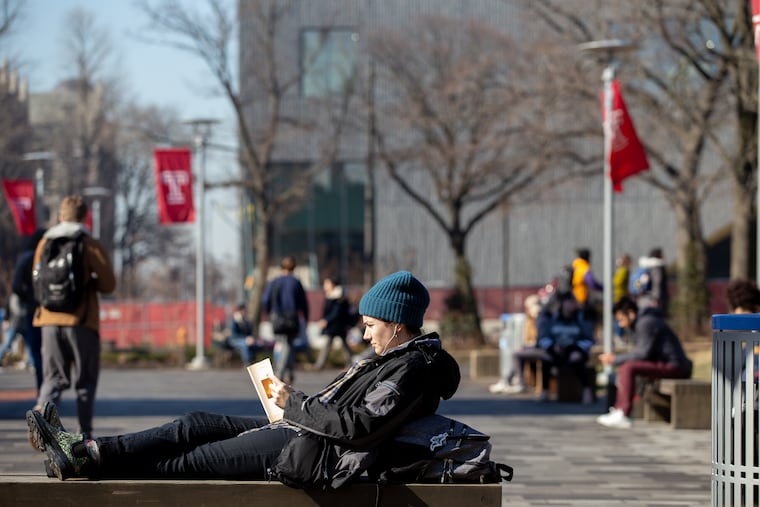Temple to offer new scholarship to help students graduate
The university announced the $1.5 million program Monday. Some aid will be provided to incoming students and the rest to current students, close to graduation, who need help to complete their degree.

The distraught Temple University senior came to Stephanie Ives’ office on Jan. 25, just a couple days before the deadline to register for spring classes.
The young woman, who already works three jobs while attending school, couldn’t afford to pay the few thousand dollars she still owed for the fall semester. That prevented her from registering for the spring. The student had recently become independent from her family and had nowhere else to turn for support, said Ives, Temple’s dean of students.
With help from other departments, Ives and her office were able to cobble together financial aid for the student, a Philadelphia resident, to pay the tab — effectively preventing her from having to drop out.
Some students aren’t so lucky. Temple wants to find a way to help more of them.
The university on Monday is to announce a new $1.5 million, need-based program called the Broad Street Finish Line scholarship, designed to help incoming students and current students near graduation who need a little help to complete their degree.
“This is going to be so helpful for those students just short of the finish line,” Ives said.
The scholarship will start in fall 2019. It’s aimed at students who are the first in their family to attend college, with preference for Philadelphia residents, though even international students will be considered. About 10 incoming freshmen out of a class of 5,150 will be eligible for $5,000 awards that will be renewable each year. The rest of the money will go toward students near completion, who will receive awards ranging from $500 to $5,000.
“We have such a socioeconomically needy student population, we could possibly obliterate this scholarship fund in a year,” said Shawn Abbott, Temple’s vice provost for admissions, financial aid, and enrollment management, who noted that nearly a third of Temple students in fall 2018 received low-income federal Pell grants.
But, Abbott said, “we won’t do that. We want to use it as a seed to grow the scholarship fund.”
Temple hopes the fund will become self-sustaining, with businesses, foundations, and alumni contributing and replenishing it. Students who receive the scholarship will be asked to contribute once they graduate and get a job, Abbott said.
“The whole concept is getting students who are recipients to pay it forward,” he said.
Other universities have similar aid programs, Abbott said. Temple specifically looked at programs at Georgia State University and the University of Pittsburgh, he said. Pitt’s “Panthers Forward” program awards 150 seniors $5,000 toward paying off federal student loan balances and then asks — but does not require — them to “pay it forward" with monthly installments after they graduate.
Many colleges, including Temple, also have emergency aid programs to help students who experience a sudden change in circumstances, such as loss of a parent or homelessness. Sara Goldrick-Rab, a Temple education policy professor, has advocated for Philadelphia to start a citywide emergency aid fund and also has contributed award money she received toward aid for college students.
Tuition at Temple this year for in-state students is $16,080. Out-of-state students pay $28,176.
Temple’s new program is designed to keep students in school and boost graduation rates, Abbott said. Temple’s six-year graduation rate is currently 71 percent.
Ives hasn’t forgotten about the student helped last month. She realizes the young woman may need help again in May, the time to pay her final bill. If she’s short of money, she won’t be able to get her diploma.
And there will be others, Ives knows.
“The student who I met with on that day is not unique,” she said. “Knowing that she’s not the only one means we have a lot of work to do.”